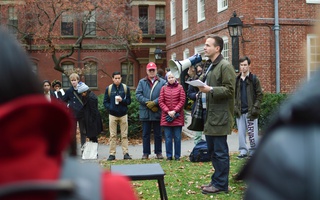Earlier this year, the Undergraduate Council’s Finance Committee passed legislation requiring a majority of the executive board members of student groups that receive substantial UC funding to attend sexual assault trainings conducted by the Office of Sexual Assault Prevention and Response and the Consent Advocates and Relationship Educators.
This week, a joint agreement between the UC, OSAPR, and the Harvard Foundation for Intercultural and Race Relations’ Student Advisory Committee took this initiative a step further. Beginning in the spring, student groups that receive Harvard Foundation funding and whose entire executive boards attend sexual assault training are eligible for a 20 percent increase in funding from the Foundation, while groups with attendance from at least half of the board could gain a 10 percent funding bump.
We commend both the UC and the Harvard Foundation for conceiving and implementing this policy. A cynical observer might point out that each year’s campaign for the UC presidency and vice-presidency inevitably leads to discussion of three issues: Candidates promise to expand mental health resources, to improve access to social spaces, and to reduce the prevalence of sexual assault. But despite the lofty goals articulated during UC campaigns, students often lament the lack of tangible actions the Council can take.
The sexual assault trainings introduced last spring, as well as this new policy, run counter to that narrative. We hope that students see these new trainings as an opportunity for progress toward a safer and more inclusive community, and not as an unnecessary burden on their extracurricular organizations.
As the Council moves forward under new leadership, the ingenuity that led to the implementation of this partnership should not be lost. The ability to disburse student group funding is the UC’s most important policy tool, and this new policy is clearly an effective use of it. It also highlights the key role that partnerships between different organizations can play in ensuring that our campus is as safe as possible. In particular, other grant making organizations like the Harvard Foundation are well positioned to help the UC in similar initiatives.
Though we support the UC’s current set of programs to encourage training, we find it unfortunate that financial incentives are still the most effective means of connecting students to in-person trainings. We do not doubt that the program would be less effective were it not tied to financial incentives, but we fear its reach will be limited to student groups that already struggle with funding—like cultural organizations—and not effect well-established groups. We continue to hope that the College will mandate annual in-person trainings for all undergraduates so that our entire community can make good on its commitment to a campus free of sexual violence.
Until the administration acts, however, the UC’s new initiative is a good provisional step and an important expansion of a program we supported when it was launched last spring. Sexual assault has plagued this campus far too long. Though more decisive action is needed, not taking action is simply not a conscionable option.
Read more in Opinion
Farewell My Chop SueyRecommended Articles
-
Seeking Safety for BGLTQ Students
-
Reorienting Efforts on Sexual AssaultIf this new training program is able to prevent even one sexual assault, then it unequivocally will have been worth the 30 minutes required for each student to complete it.
-
 'A Box to be Checked': Harvard College's Sexual Assault Prevention Efforts
'A Box to be Checked': Harvard College's Sexual Assault Prevention Efforts -
Harvard College Proceeds with Online Title IX Training for Second YearThe College used input from undergraduate focus groups to update its sexual assault prevention training modules for 2017, according to Title IX Coordinator Emily J. Miller.
-
The State of Title IX at HarvardBut it is not enough for us to click through a few slides on a computer screen. We, along with offices dedicated to sexual harassment and assault, can and must do more.













